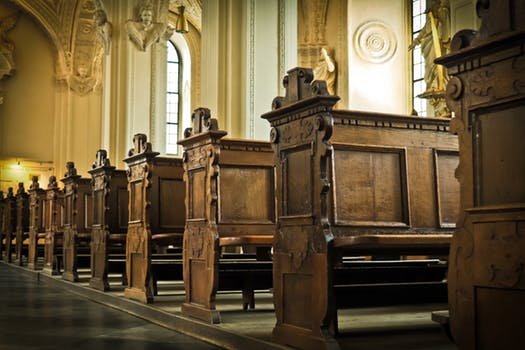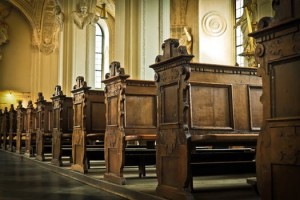 Rahab was a prostitute in the city of Jericho when the people of Israel showed up with the command from God to go in and take the promised land. The Israelites sent in spies to check things out and they wound up at the home of Rahab in Jericho and she went out of her way to hide and protect them when they were in danger. Even though she was not an Israelite she believed in the stories she had heard of their God and chose to align herself with him rather than with her own people. And she and her family were spared when God destroyed the city. You can read more about the story of Rahab in Joshua 2.
Rahab was a prostitute in the city of Jericho when the people of Israel showed up with the command from God to go in and take the promised land. The Israelites sent in spies to check things out and they wound up at the home of Rahab in Jericho and she went out of her way to hide and protect them when they were in danger. Even though she was not an Israelite she believed in the stories she had heard of their God and chose to align herself with him rather than with her own people. And she and her family were spared when God destroyed the city. You can read more about the story of Rahab in Joshua 2.
Later on Rahab is mentioned in Matthew 1:5 as part of the genealogy of Jesus. She was David’s great, great grandmother. She is also mentioned in Hebrews 11 as part of the faith hall of fame. And she is given as an example of faith showing itself in works in James 2.
In that passage James poses a very interesting question in verse 14: 14 What good is it, my brothers, if someone says he has faith but does not have works? Can that faith save him?
This is a strong challenge. He is questioning people’s salvation. But notice that James is not comparing those who have faith to those who have works. That is not really the point. He is comparing those who say they have faith, but it doesn’t show in the way they live their life, compared to those who are visibly demonstrating their faith by how they live.
He gives an example in verses 15 and 16: 15 If a brother or sister is poorly clothed and lacking in daily food, 16 and one of you says to them, “Go in peace, be warmed and filled,” without giving them the things needed for the body, what good is that?
In this specific example James is not talking about a stranger, but about a brother or sister in Christ. He is talking about someone within the body of Christ who is in obvious need. This implies that the person who says they have faith knows the person in need, knows their need, and rather than helping them out, simply says “go in peace, be warm and well fed.” This almost seems sarcastic, because the words they say are in direct correlation to the specific needs of the person. But rather than help them, they just say some words. This is the exact issue that James has with their so-called faith. It is nothing more than words.
James calls that kind of faith dead in verse 17: 17 So also faith by itself, if it does not have works, is dead.
James is calling for our faith to be alive. Our faith should be evident in our lives. People should be able to see Christ in us. Our testimony cannot just be a testimony of words, it needs to be a testimony of life.
In verses 20-23 James points to the example of Abraham and how his faith showed up in what he did and then he shares a controversial statement in verse 24: 24 You see that a person is justified by works and not by faith alone.
In this verse it seems like James is kind of contradicting the belief that we are saved by grace through faith, rather than works. But we need to understand verse 24 in light of the rest of what James is saying. He is not comparing faith to works, he is not even saying it is faith plus works, he is saying that true faith is shown in works. If we really have faith, then it should be evident in our lives.
And then James points to the example of Rahab and ends with a strong challenge in verses 25 and 26: 25 And in the same way was not also Rahab the prostitute justified by works when she received the messengers and sent them out by another way? 26 For as the body apart from the spirit is dead, so also faith apart from works is dead.
So like the example of Abraham, Rahab is commended here for her actions or works. That does not mean that she was saved by her works, but rather that her works were a response of faith. The work that James is referring to is that she harbored the spies and hid them and went out of her way to help them. Why do you think she did that?
In Joshua 2:8 – 13 Rahab actually answers that question for us. She tells the spies about how word of the Lord had spread and fear of him had fallen on the land and then she testifies to what she believes at the end of verse 11: for the Lord your God, he is God in the heavens above and on the earth beneath.
The reason she helped the spies is because she believed in their God. She believed that he was who he said he was and that he would do what he said he would do. That is faith. She had faith and so she did what she did. Her works were her response of faith.
I believe the example of Rahab is very poignant. Notice that James refers to her not just as Rahab, but as Rahab the prostitute or Rahab the harlot. Her life was so defined by prostitution that that is how she is known. And yet James refers to her being justified by her works. He is not talking about her work as a prostitute, but by what she did when she took care of the spies. So even though she is known as Rahab the prostitute, with that stigma attached to her for her whole life, she is described here and in the book of Hebrews as a woman of faith. She could have let her past define her and continued along that path, but she stepped out in faith and followed God.
I think that is a powerful reminder to us. We may often look back at our lives with feelings of failure and discouragement. We may even feel defined by things that are not flattering. But while we can’t change the past, we don’t have to let it define how we are going to move forward. I am not calling on us to focus on the work we haven’t done, or the things we have messed up or done wrong. I am calling us forward from this point on, that our faith would be alive and that we would step out in faith and follow God.








